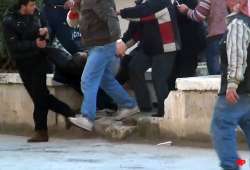Syria Opposition Charts Transition As Blood Flows
Damascus, Jan 1: Syria's opposition, hoping to topple President Bashar al-Assad, has charted a transitional period, as more civilians died in a regime crackdown despite the presence of peace monitors.Meanwhile the rebel Free Syrian Army

Damascus, Jan 1: Syria's opposition, hoping to topple President Bashar al-Assad, has charted a transitional period, as more civilians died in a regime crackdown despite the presence of peace monitors.
Meanwhile the rebel Free Syrian Army said it is suspending operations against regime forces during the one-month renewable mission of monitors deployed in Syria to implement an Arab League peace plan.
At least 32 civilians were killed today, including 25 who were shot dead by Syrian forces who opened fire on massive protests that rocked the country while the monitors toured flashpoints, a watchdog said.
The Syrian Observatory for Human Rights also reported that Syrian forces used “nail bombs” to disperse anti-regime rallies, and fired live ammunition, tear gas and stun grenades at tens of thousands of pro-democracy protesters.
Funerals for several victims were held Saturday across Syria, the watchdog said, including in the northern city of Idlib where mourners called for revenge, a YouTube footage showed.
Security forces also fired warning shots into the air as thousands of people began pouring into a square in the restive Damascus suburb of Douma for a funeral ceremony, the Britain-based Observatory said.
In Cairo, headquarters of the Arab League, the opposition Syrian National Council (SNC) and the National Coordination Body for Democratic Change in Syria (NCB) inked a deal late Friday as they eye a post-regime transition.
An English language statement from the NCB said the deal “sets out the the political and democratic rules for the transitional period,” should Assad be ousted by the uprising that erupted in March.
The accord also “determines the important parameters for Syria's future which aspire to ensure that the homeland and every citizen's rights are treated with dignity, and for the foundation of a civil democratic state.”
NCB chief Hassan Abdel Azim told AFP the accord is designed to fend off a Libya-style foreign military intervention in Syria and protect civilians suffering from the wrath of Assad's autocratic regime.
The UN estimates that more than 5,000 people have been killed in the regime's crackdown on dissent since March. Assad's government insists the violence has been instigated by “terrorist armed gangs” with foreign help.
On Friday, responding to calls by Internet activists, tens of thousands of Syrians flooded the streets across the country to make their voices heard by the Arab observers.
“We urge you to make a clear distinction between the assassin and the victim,” activists of the Syrian Revolution 2011 said on their Facebook page.
The United Nations said it expects Syria to grant unfettered access to the hard-won Arab observer mission which Damascus only agreed to after weeks of prevarication.
“It is critical that the observer mission be given unhindered access and full cooperation by the government of Syria, and that its independence and impartiality be fully preserved,” UN spokesman Martin Nesirky said.
According to the Observatory, monitors visited Idlib, Hama, Daraa and the Homs neighbourhood of Baba Amro on Friday. State media said they also went to Hama and spoke to wounded people in a government hospital.
Jordan said 12 judges, army officers and peacekeeping experts were ready to join the mission as soon as Amman gets the go-ahead from the Arab League, Ad-Dustour newspaper reported quoting Information Minister Rakan Majali.